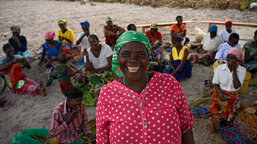“I used to think only about keeping my own livestock alive. Today my goal is to help other farmers as well,” says Patrick, who turns crop residues into low-cost feed with help from Caritas Czech Republic.
From goats to feed-processing machines
After years of raising goats and supplying them to humanitarian organisations, Patrick bought a small farm near the city of Mongu in 2021 and began looking for ways to expand it. “Goats were just a seasonal business; demand came once a year. I needed something that would support me all year round,” he explains.
Patrick noticed that every farmer faced the same problem: affordable livestock feed was hard to find. In 2023 he invested in an oil press and a hammer mill. By processing the by-products left after pressing soybeans and sunflowers, he produces a key ingredient for feed mixes, cutting costs for himself and for neighbouring farmers.
When drought hit Zambia
Shortly after Patrick launched his operation, a prolonged drought struck in 2023. Soy and sunflower hardly grew in the fields, forcing him to rethink his plan. “I realised my original idea was too narrow. I couldn’t stay a small-scale producer; I needed to reach a commercial level so that other farmers could benefit too.”
One climate-smart innovation on his farm is reviving an old industrial borehole. With a reliable water source, Patrick can keep growing vegetables during dry spells and process part of the harvest into feed ingredients.
Knowledge and networks from Caritas
When Patrick first met Caritas, his business was already running. Caritas helped him attend several trainings and widen his customer base. One course covered feed-safety standards, where he learned about the danger of aflatoxins and how to prevent them. “Many livestock owners have no idea their feed can be toxic. They give it to their animals without hesitation, which can lead to big losses,” he explains.
Caritas also connected Patrick with more producers and buyers, making it easier to secure raw materials and customers. “I can own the machines, but without a network of farmers it wouldn’t work,” he adds.
Contract farming and more jobs ahead
Looking ahead, Patrick plans to venture into contract farming — a model he discovered through Caritas training and believes will stabilise both his raw-material supply and the incomes of smallholders. In contract farming, a processor provides farmers with seed, advice and sometimes advances, while growers commit to delivering an agreed amount and quality of produce at a pre-set price. Patrick has already hired additional staff and hopes to employ even more people from the area in the future.
Caritas Czech Republic in Zambia
Caritas Czech Republic helps farmers in Zambia gain valuable knowledge to improve their farming. We focus, among other things, on increasing agricultural yields and providing specialised training. For example, Caroline was with our support able to start her own poultry farm.














